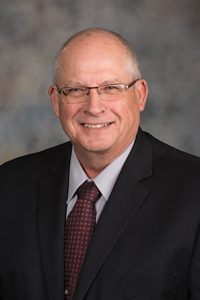Fee cap for cell tower applications proposed
The Transportation and Telecommunications Committee heard testimony Feb. 3 on a bill that would cap the amount that cities could charge to review certain cell tower projects.
Introduced by Sen. Curt Friesen of Henderson, LB898 would allow the state or any agency, county, city, village or other political subdivision to fix and charge an application fee for the submission, processing and review of an eligible facilities request to collocate a new wireless facility, site a new wireless support structure or substantially change an existing wireless support structure.
Friesen said the bill would ensure that large wireless facilities are subject to uniform regulation by those authorities. He said its provisions are not intended to affect small cell facilities, the subject of a bill the Legislature passed last year.
“Our goal in Nebraska is to get superior telecommunication services to all of our citizens,” Friesen said. “By providing limitations on fees for applications to improve those services, we do a service to Nebraskans.”
LB898 defines eligible facilities request as a request to modify an existing tower or wireless support structure that hosts a wireless facility in a way that does not “substantially change” the physical dimensions of the tower or the support structure.
Substantial changes would include, among others, increasing a tower’s height beyond a certain percentage or adding an appurtenance to a tower that would protrude beyond a certain distance.
Under the bill’s provisions, providers could install or place a wireless facility on or adjacent to buildings, electrical transmission towers, water towers and certain other existing structures.
An authority could charge up to $500 for the review of an eligible facilities request or collocation application on an existing wireless support structure. It could charge up to $1,000 for the review of an application to place a new tower and associated wireless facility.
The application fee would be based on the authority’s “actual, direct and objectively reasonable costs incurred for all aspects of an application review process.”
LB898 would require that any costs incurred for review by an outside consultant be included in the application fee. The fee could not be used for travel time or expenses incurred in a consultant’s review of an application or reimbursement for a consultant that is based on a contingency fee or a results-based arrangement.
Mike Harms testified in support of the bill on behalf of Viaero Wireless. He said certain consultants hired by a few Nebraska towns and counties to review cell tower siting and upgrade applications have imposed “undue fees and stringent processes that add no value to the project.”
Viaero now avoids work anywhere such a consultant is retained, Harms said.
“This bill would still allow the legitimate consulting work that is occuring in the majority of Nebraska communities while barring those that are abusing the process,” he said.
Mary Jacobson testified in support of the bill on behalf of U.S. Cellular. She said wireless providers continually must build and update cell towers, also called macro towers or macro cells, as technology improves and network traffic increases.
“Unfortunately, the deployment and upgrading of these macro towers has been hindered by extraordinarily excessive costs and delays imposed on the industry by some outside siting consultants,” Jacobson said.
Shelley Sahling-Zart testified in opposition to LB898 on behalf of the Lincoln Electric System, the city of Lincoln and the Nebraska Power Association.
She said wireless providers did not raise the problem of high consultant fees impeding wireless deployment during the three years stakeholders spent negotiating a compromise that culminated in the 2019 Small Wireless Facilities Deployment Act.
Sahling-Zart said providing a uniform standard for macro cells presents different safety and siting considerations than it did for small cells and that capping fees at the proposed level would not allow cities to recover review costs.
Additionally, she said, LB898 would allow providers to collocate large wireless facilities on electrical transmission towers, which she said was a “nonstarter” in the small cell negotiation because of safety and reliability concerns.
Tara Vasicek, Columbus city administrator, also testified in opposition. After “mass opposition” to a cell tower that was installed in a city park a few years ago, she said, Columbus adopted an ordinance that requires the city to notify affected property owners and hold a public hearing before such a tower is built.
Vasicek said the ordinance requires the city to use wireless facilities application fees to hire a consultant to review applications and inspect completed projects. The proposed caps would prevent the city from recouping those costs, she said.
“The language in LB898 would not provide the city of Columbus with the appropriate limits to ensure that these facilities are delivered to the public safely,” Vasicek said.
The committee took no immediate action on the bill.

